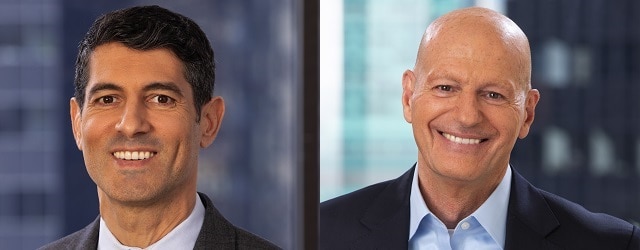Global Finance spoke with Tom Masi and Nuno Fernandes, co-portfolio managers for Emerging Wealth Equity strategy at GW&K Investment Management, about wealth trends in China, India and other emerging markets.
 Nuno Fernandes (l) and Tom Masi (r), co-portfolio managers for Emerging Wealth Equity strategy at GW&K Investment Management. |
Global Finance: You say middle class in emerging markets will account for over 50% of world consumption by 2050. What could derail this trend?
Nuno Fernandes: In China and India you have the two biggest consumer pools in the world; and if those two countries alone get it right, you’ll get to 50%. What could go wrong? If China gets into a conflict with the United States, especially a war, that could derail the process. We don’t think that is going to happen, though.
GF: How seriously do you take China’s official economic figures?
Fernandes: We know the Chinese government massages the economic numbers. How do we get around that? We use investment brokerage houses that have been in China for many decades and that run private-sector data—especially on SMEs [small and medium size enterprises]. We also use the companies whose shares we own. If we call LVMH, and they tell us that 95% of their stores in China are open, we’re going to believe that. Having said that, if you look at China’s latest PMI [Purchasing Managers Index] numbers, they show a big contraction has occurred. They haven’t massaged those numbers.
GF: How has the coronavirus affected the Indian economy?
Fernandes: India came forward with a stimulus package of about 2% of GDP. We think that will have to be increased. The pandemic’s impact on the economy will be severe, as it was in China; but India is more rural, less developed, so its PMI numbers might not be as dramatic as China’s.
Tom Masi: In the longer term, we think a lot of manufacturing is going to move out of China, mainly because the Chinese worker has become too expensive. India, with a young workforce, has the opportunity to capture a big share of the global manufacturing business. We are not convinced, though, that the government is acting quickly enough to capitalize on that opportunity.
GF: Is China close to solving its ecological problem?
Masi: The government has long known it has a pollution problem, but couldn’t solve it because promoting employment was a higher priority. Recently, though, they have been able to find work for many displaced coal workers, among others, in service areas—as drivers in the food delivery sector, for instance. The government now is ahead of plan in shutting down its polluting factories.
Fernandes: China knows it has to shift from carbon-based energy.
GF: Will technology play a bigger role in the post-Covid-19 world, in the markets in which you are involved?
Fernandes: Chinese hospitals are too crowded, and the government is interested in shifting consultations to online. We have a telemedicine firm in our portfolio called Ping An Good Doctor. In the first six weeks of Covid-19, that firm increased its online consultations tenfold. They can draw on a database with close to a billion consultations. Users input symptoms through their phone, and the AI-driven app tells them which medicines to take. The user fills a prescription without talking to a doctor. China’s Hubei Province, whose capital is Wuhan, recently signed them up.
Masi: The crisis could accelerate other technology businesses, like online education. We’re looking at those businesses too.
GF: Do you see much opportunity in Africa?
Fernandes: That is definitely a big future growth area, but Africa has a problem: excessive corruption. We have made investments in Africa through South African companies that know the continent and have invested in sub-Saharan Africa where the growth rates are tremendous—but they have gotten their shirts ripped off.
Masi: In meeting after meeting, those investment firms told us how they were investing outside of Africa—in Germany or the UK, say. We concluded Africa is still a difficult environment in which to operate, and they are waiting for a better day.



